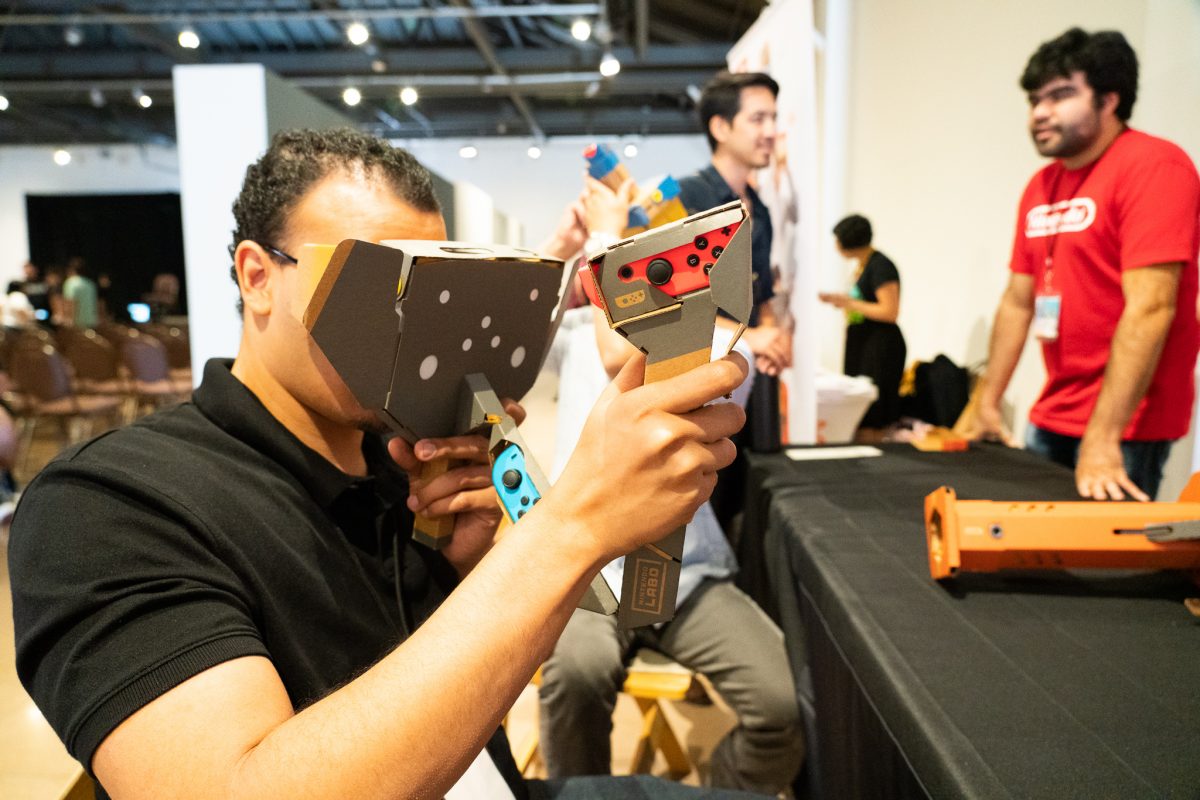

Ricardo Rodríguez, a Puerto Rican gamer living in Los Angeles, tries out the Nintedo Labo VR kit. (Photo by Francisco Lozano/Latino Rebels)
LONG BEACH — The first Latinx Games Festival was held at the Museum of Latin Art (MOLA) on Saturday. Hosted by world-renowned gamer Jason Vega, the event brought together game developers from the U.S. and Latin America.
The festival was founded with three goals in mind, according to the event description: to bring together major players who can discuss opportunities in the industry, to connect and nurture Latinx gamers and developers, and to work together to provide a platform for rising Latinx talent.
Vega, a New Yorker of Puerto Rican descent, recently moved to Long Beach. His goal for the festival was to unify communities of color and overcome obstacles such as social, economic and political strife. According to Vega, these obstacles have a direct impact on the game development industry. Vega hopes to expand opportunities of networking to the communities as well as to inspire a DIY-attitude for creators to develop small, start-up game companies.
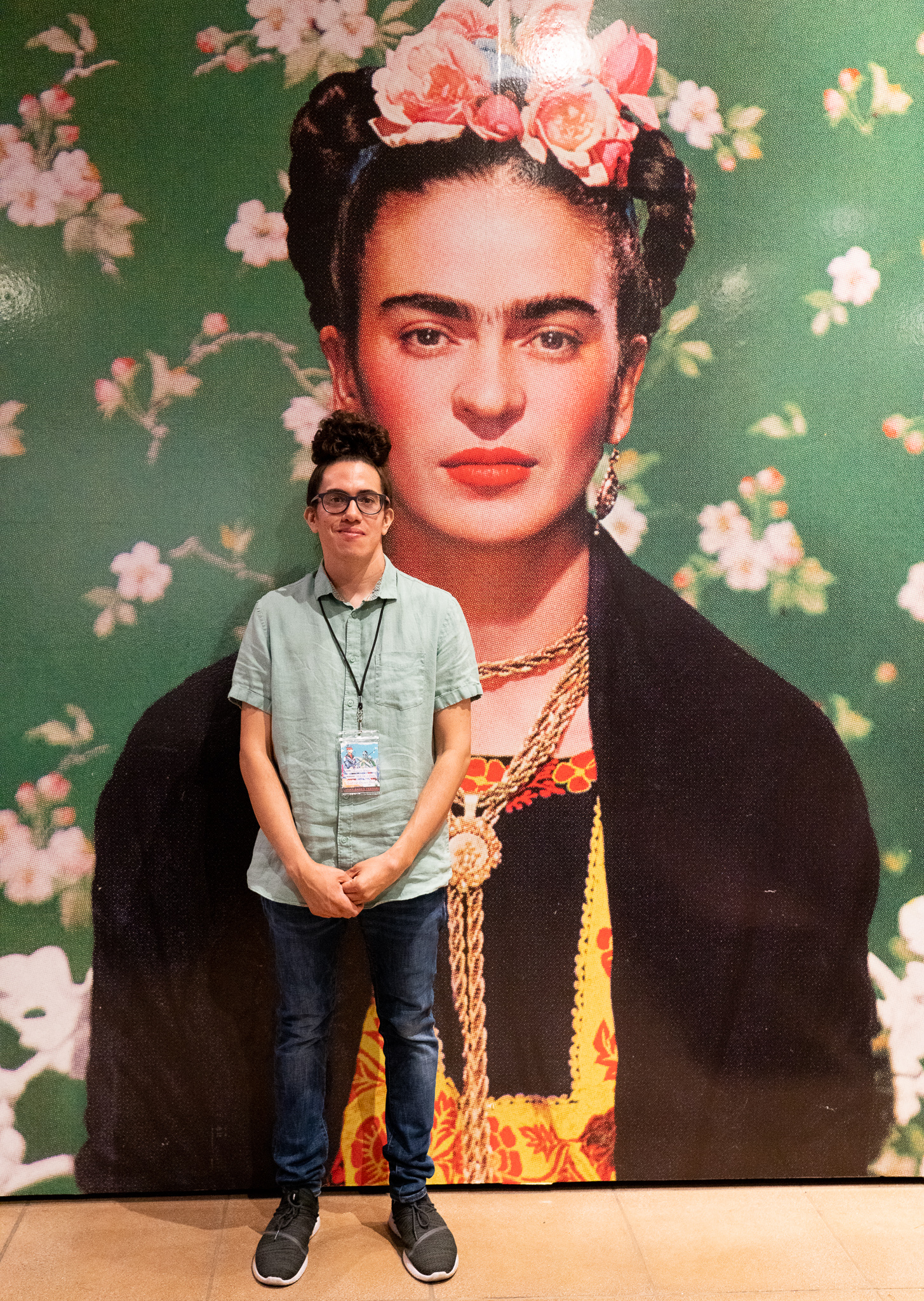

Jason Vega posing next to a Frida Kahlo art piece at the Museum of Latin Art. (Photo by Francisco Lozano/Latino Rebels)
The festival featured speakers, roundtable discussions, and an arcade specially curated for the occasion with games from Latin American countries.
Thank you all so much for making the 1st @LatinxGamesFest so special. We planted the seeds for new opportunities, new beginnings and new friendships. We all participated in the birth of a new community, and we’re ready to take on the world! ??? @molaa https://t.co/jPvvauC85k pic.twitter.com/1ro4pn3nq1
— Latinx Games Festival (@LatinxGamesFest) September 16, 2019
During his address, Vega spoke of the festival as being his “wildest dream.”
“This story is not about me. It’s about everyone in this room, community organizers, all you here. [It’s] also about using my own money, the sleepless nights, the pain you feel in your skin when you’ve been working too hard and your eyes don’t feel the same. You don’t wake up the same. You have nightmares about things going wrong,” Vega told a room full of attendees, “There is a lot of personal and professional sacrifice that goes into creating an event like this one, so I’m not going to bore you with how hard this was to put together but instead, I’m going to embrace the fact that I really did not do this alone.”
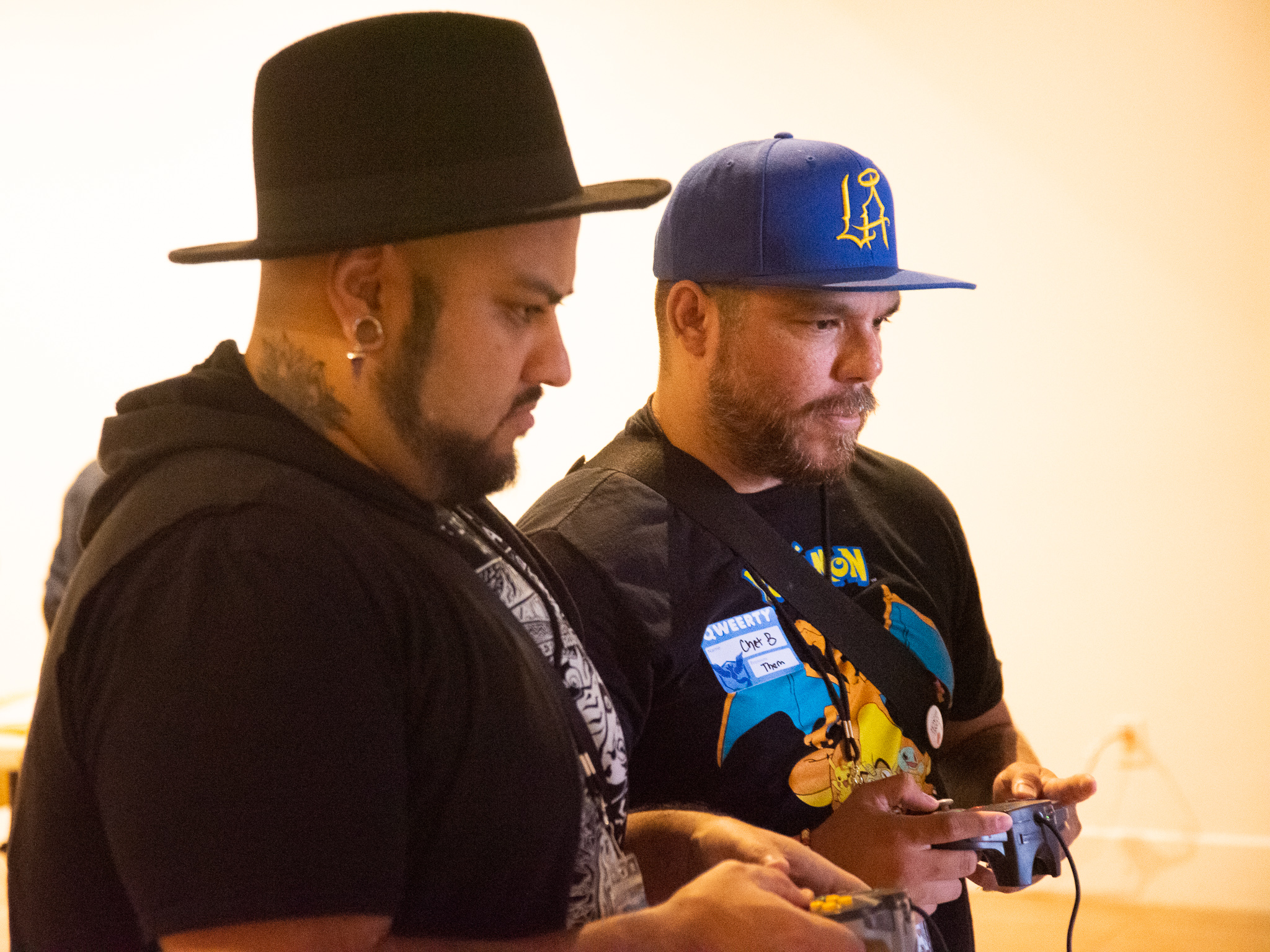

Chet Barbour (right) and Jerónimo Senado of Long Beach play Pókemon puzzle at the Qweerty booth. (Photo by Francisco Lozano/Latino Rebels)
Jason identifies as Nuyorican. He told Latino Rebels during an interview about his journey to Long Beach and why he held the event there.
“I was backpacking in California, actually glorified apartment hunting. I had never been to Long Beach, though I had been to California on business meetings. While walking around after checking in where I was staying, the first thing I saw was the Museum of Latin Art. I knew right then this is the place where I need to be and I knew that this event that I was doing had to happen in this museum,” he said.
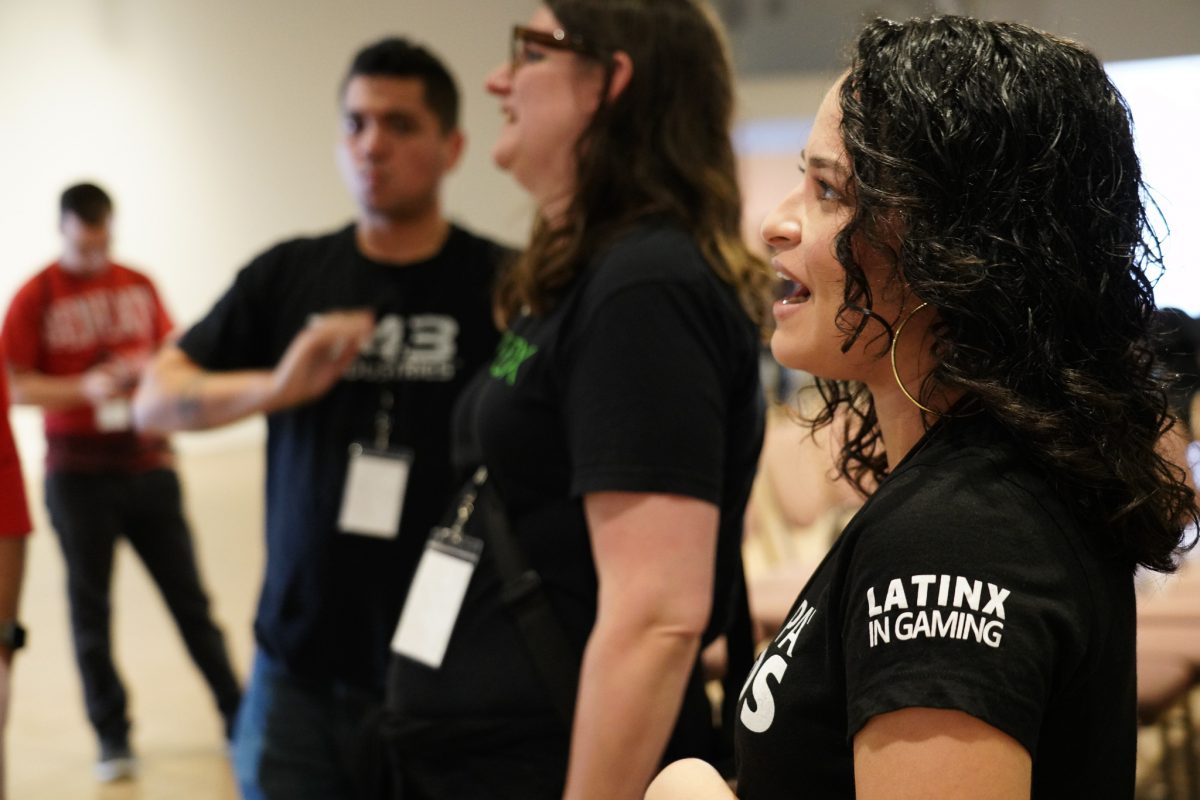

Gabriela Ponce of Turn 10 studios chats with fellow Latinx developers. (Photo by Francisco Lozano/Latino Rebels)
Though once Vega began organizing, he described feeling lonely. “It has been different. I won’t say it has been bad. SoCal is represented by triple-A companies, huge game companies, and SoCal is so big that everything is spread out so thin, and I have to admit that I felt so alone,” he said.
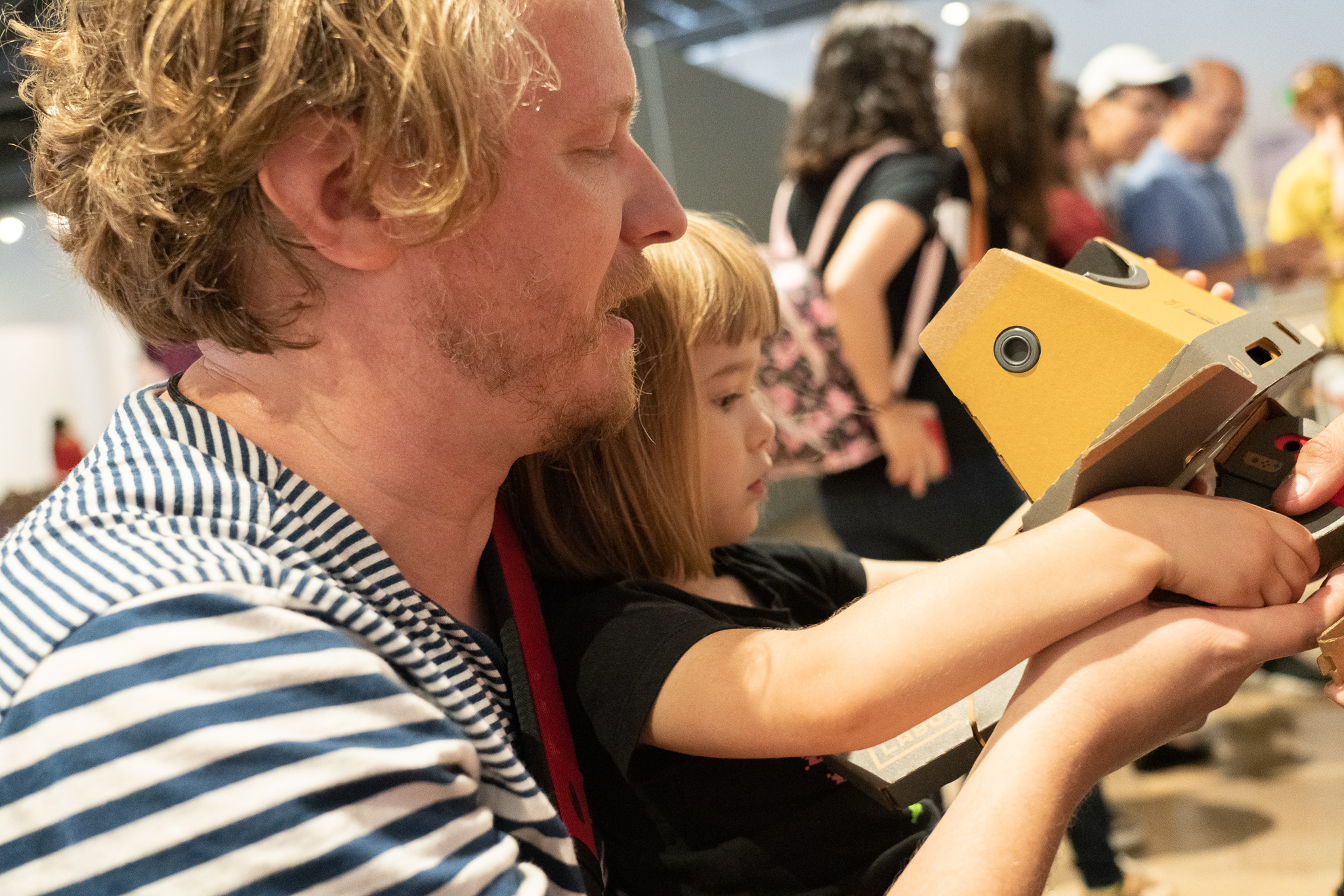

Borut Pheifer introduces his 3-year-old daughter, Petra, to gaming. (Photo by Francisco Lozano/Latino Rebels)
For Vega, his community and identity are a big part of what he does. During her address, Trinidad Hermida, Head of Diversity and Inclusion of Niantic, said that when she met Vega, he was wearing a giant Puerto Rican flag. “He was walking around with the Puerto Rican flag wrapped around him and I said when I saw him, ‘Who are you and why are you walking around with the Puerto Rican flag like that?’ [He responded], ‘I’m Boricua and proud of it.’
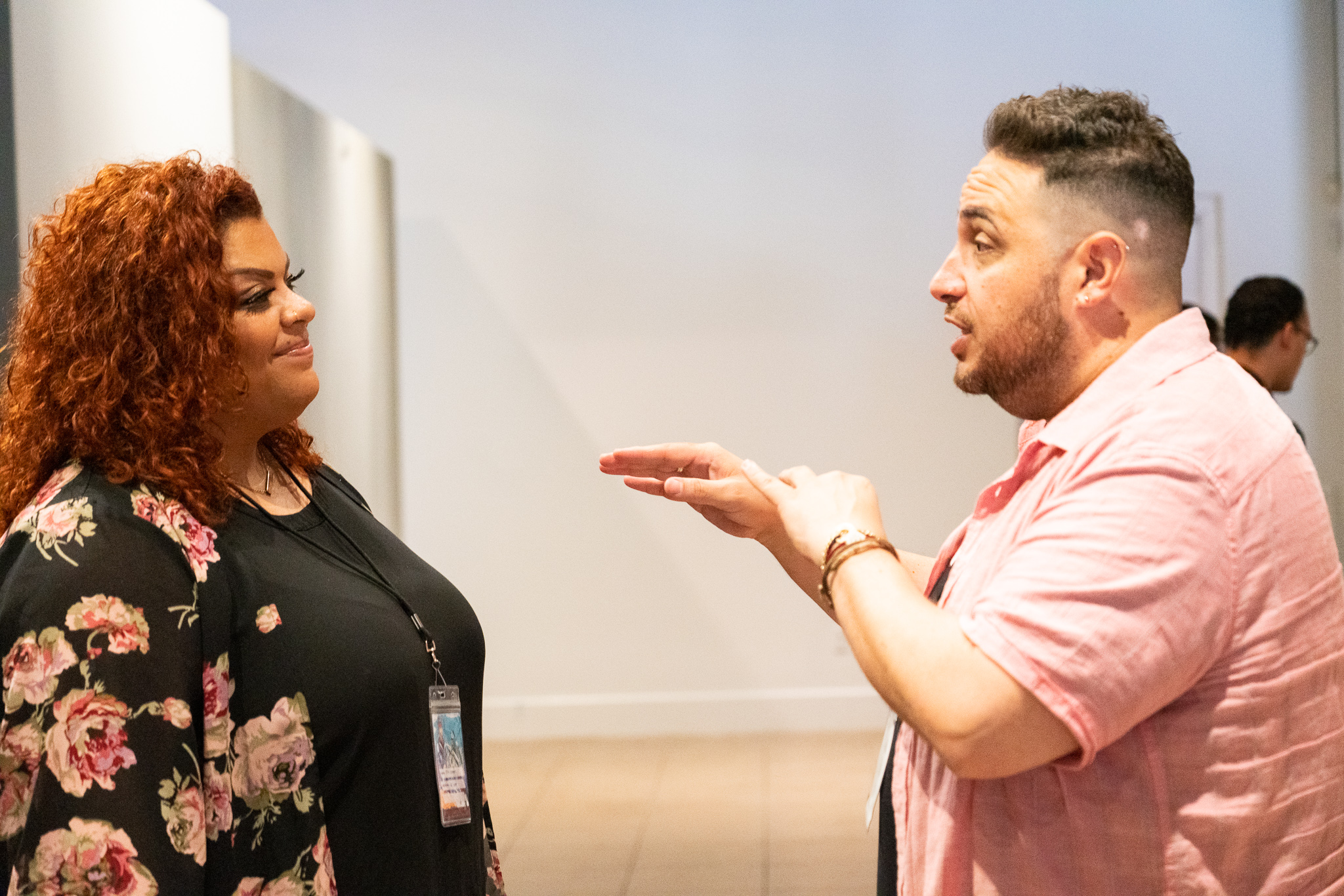

Trinidad Hermida talking to a peer during the Latinx Games Festival in Long Beach, CA. (Photo by Francisco Lozano/Latino Rebels)
Vega started playing games at the age of three, with popular games like Super Mario Brothers, and says he fell in love when he turned seven years old. “One of my childhood memories is playing Defender on the Atari,” Vega recalled.
When asked if he has ever played the original Pac Man, he said, with his eyes gleaming, “Oh yes, I’ve have played the original one at the arcade.”
Pac Man was one of the early video games back in the 1980’s and was available at arcades throughout the world, a game that probably came out before Jason was born.
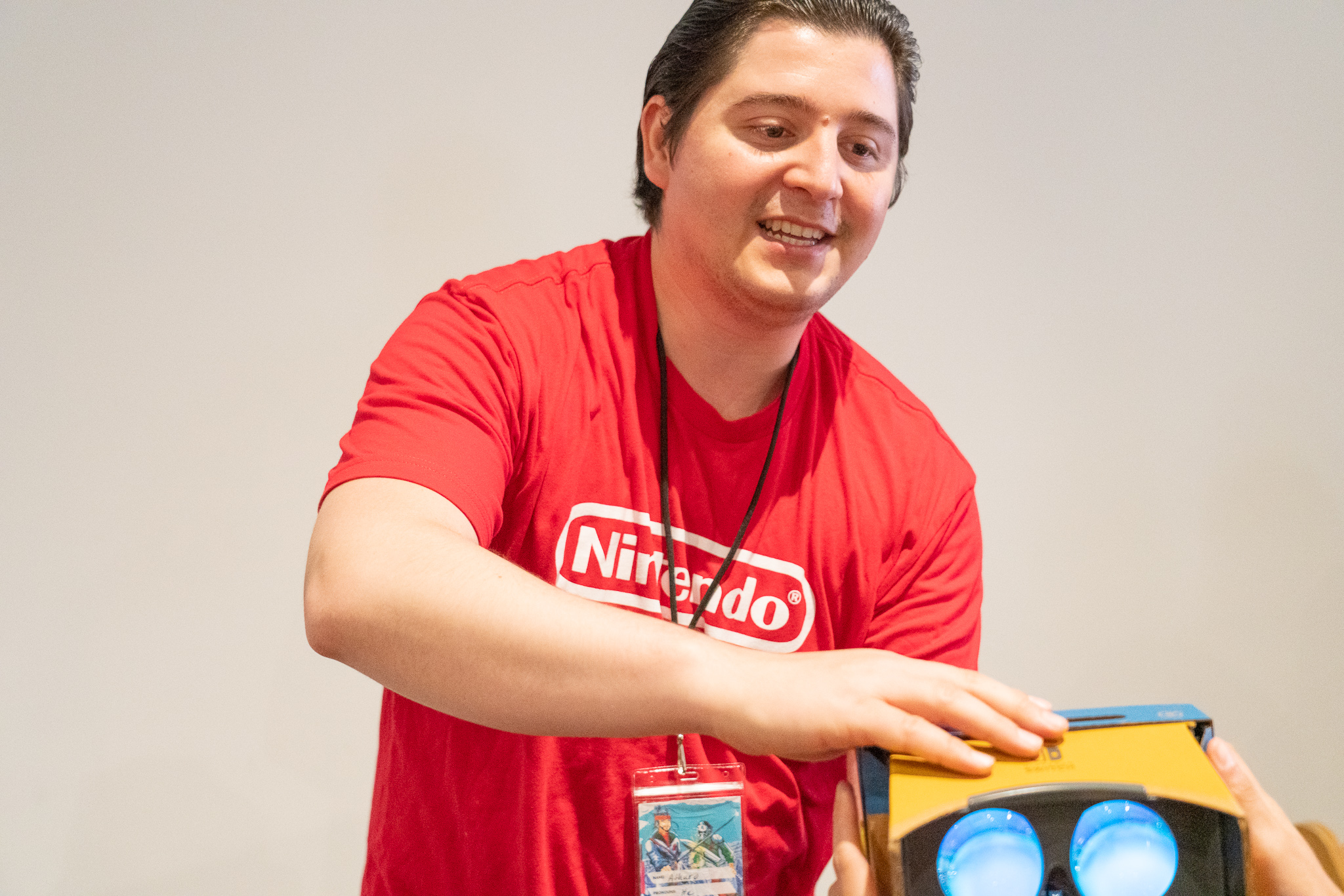

Arturo Jauregui of Nintendo shows an attendee how to use the VR kit. (Photo by Francisco Lozano/Latino Rebels)
Arturo Jauregui of Nintendo was excited to be at the event and to speak about his own journey. Jauragui’s parents are from the border town of Mexicali, Mexico, though he was born on the U.S. side of the border. His family made the sacrifice of crossing the border every day so he could attend school in the U.S. For the last five years, Jauregui has created one game a year, including Mini Mario.
He began by studying civil engineering while doing art and animation on the side, which became his passion and prompted him to get his master’s degree.
“Before I completed my master’s, I was already working for Nintendo,” Jauregui told Latino Rebels. When speaking of the importance of the event to people of underrepresented communities, Jauregui said, “As a kid, you see these games that are magical and you think some geniuses, and they are geniuses, create them somewhere. These events show you that you can be part of that crew as well.”
Jauregui is now one of those geniuses.
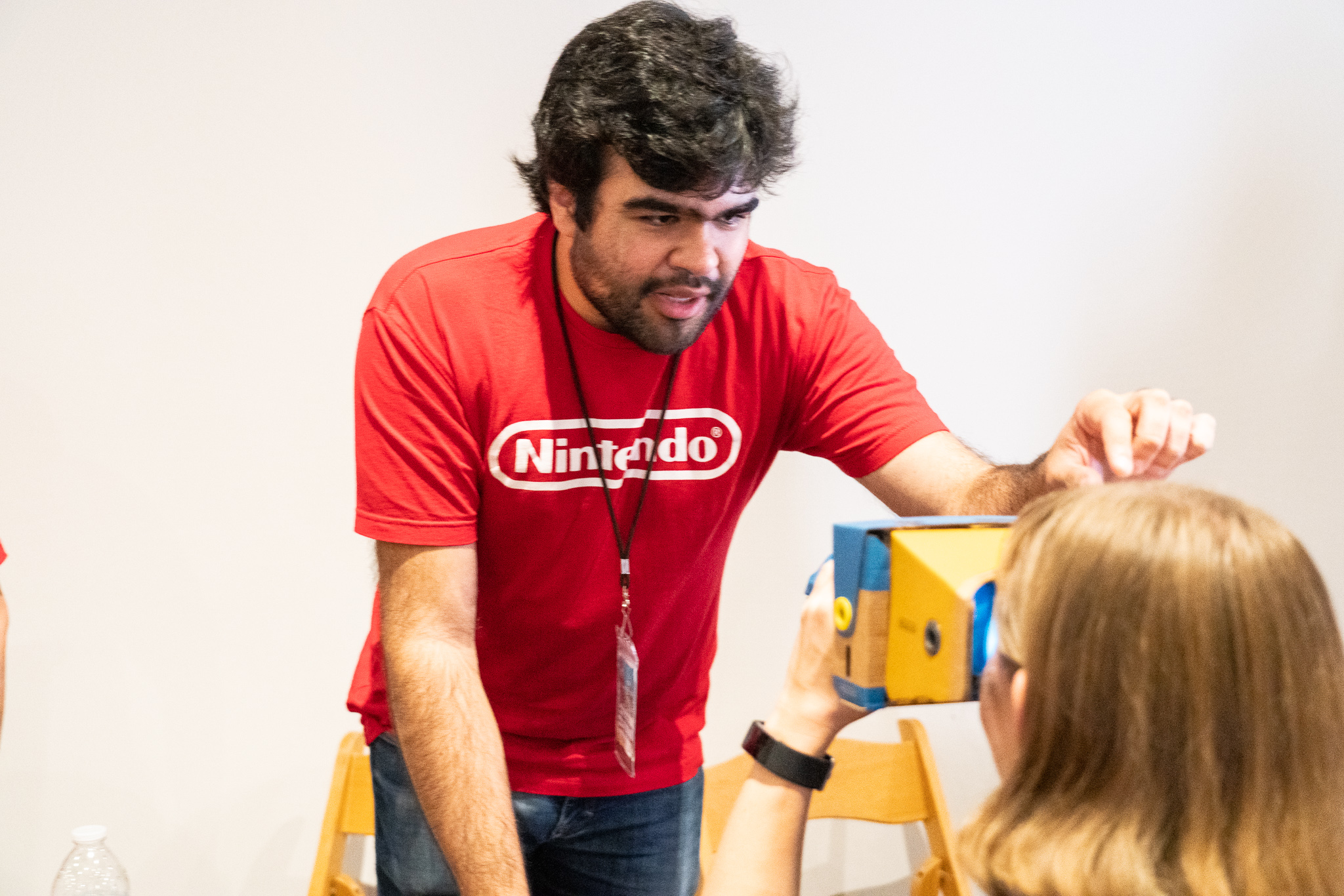

Fernando Silva, originally from Mexico DF, demonstrates the VR kit. (Photo by Francisco Lozano/Latino Rebels)
Joining Jauregui was Fernando Silva, also of Nintendo. Silva is from Mexico City.
“When I was two years old, I was playing Genesis. Later I traveled to Canada with my family, and there I found the Super Nintendo and I started playing Super Mario World,” Silva told Latino Rebels. “My mom told me that when I was just a little kid I said ‘Un día yo quiero trabajar en Nintendo’ (‘One day I want to work for Nintendo’), and who would’ve thought that one day, I would be working for Nintendo?”
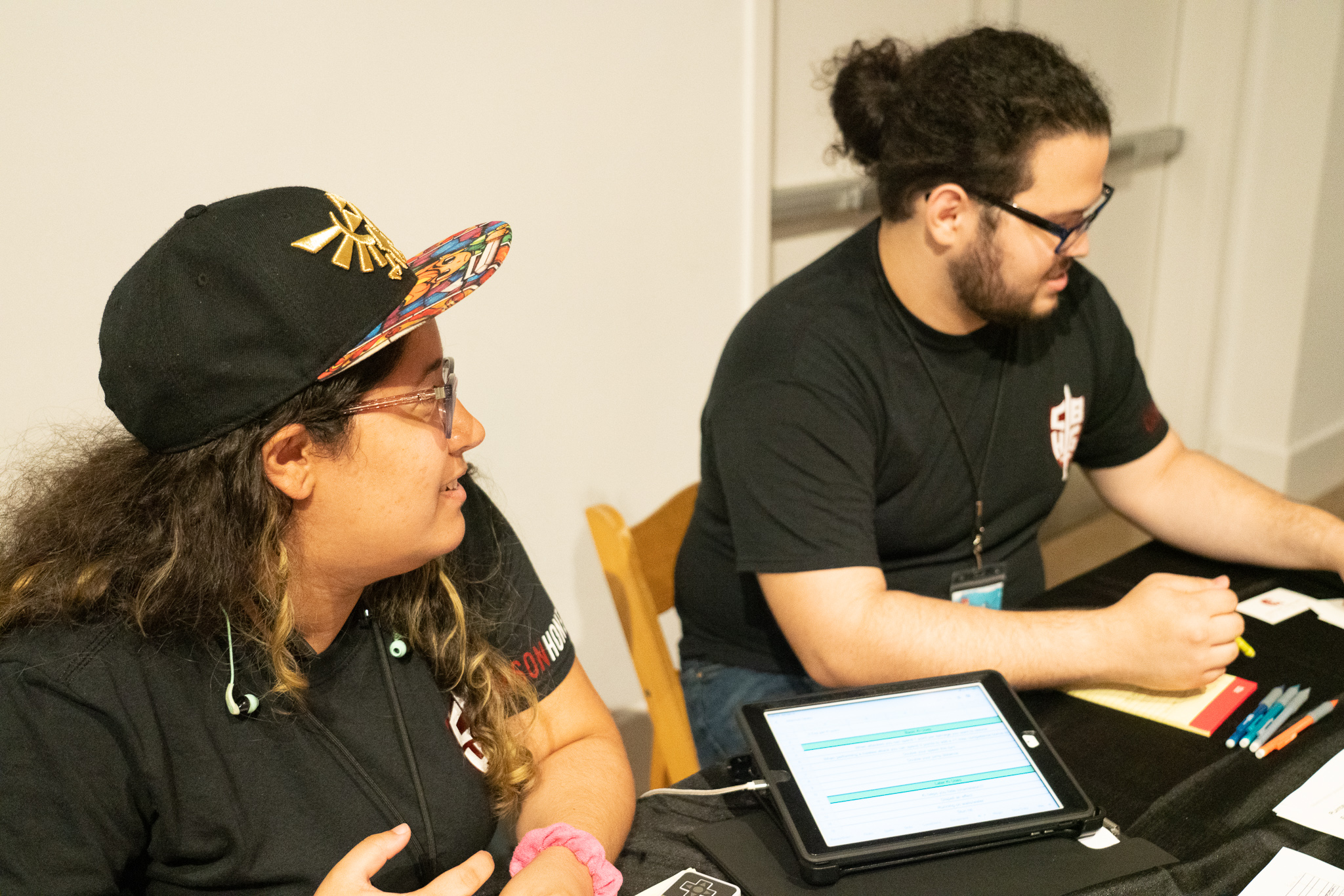

Laura Reyes and Dylan G. Cruz of CHBG flew in for the event. (Photo by Francisco Lozano/Latino Rebels)
“When I was in high school in Mexico City, I started thinking what I wanted to be. On one side, I wanted to be a surgeon like my dad. On the other hand, I was already doing some programming on small games, and I said, ‘I like to do this’” Silva continued.
He came to the U.S. on a student visa to study. After he graduated, he got his H-1B work visa and started working for Nintendo. Silva’s eyes did not stop beaming for a second and his heart seemed to skip a beat every now and then as he told his story during the interview. “Sí, esto es muy padre” (“Yes, this is so cool!”), he said.
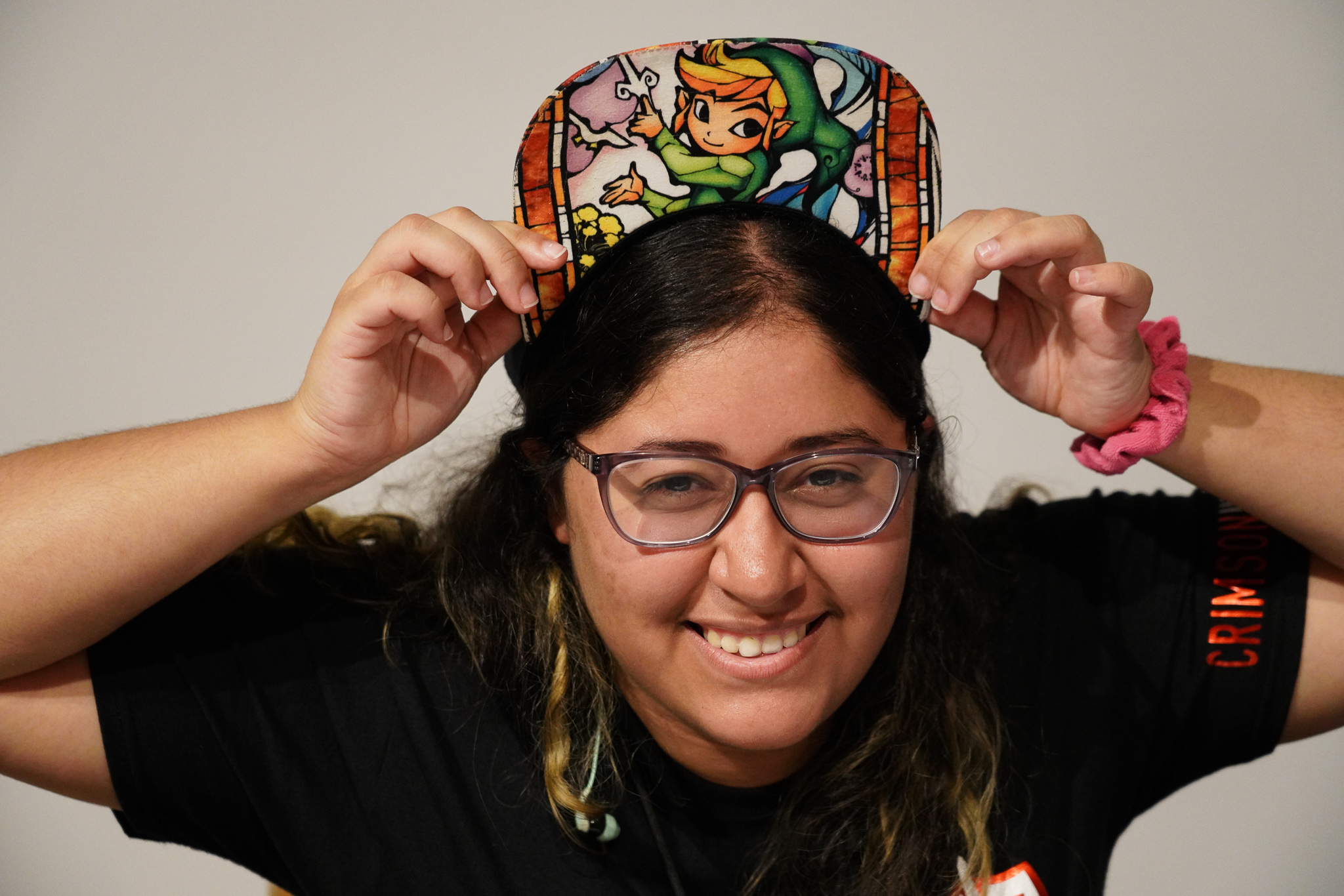

Laura Reyes of CHBG shows her true colors. (Photo by Francisco Lozano/Latino Rebels)
“I know that the Latinx community is a big spender of the video game industry. We have big spending power. We are some of the most popular streamers on YouTube and Twitch. We are some of the best players but [are] definitely underrepresented on the video game covers and in game developing,” Vega said. “That is why these events are important. We are getting there.”
***
Francisco Lozano is a freelance news photographer based in Los Angeles. You can follow him @FrancisLozano7.


